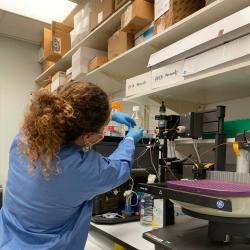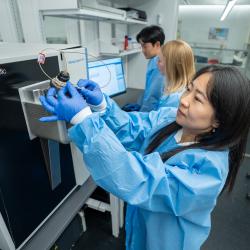Gut Microbiome Changes Long Before Celiac Disease Onset
Researchers find early, distinct changes determine which at-risk infants will develop the disease
Researchers including Distinguished University Professor Rita Colwell from the University of Maryland identified substantial microbial changes in the intestines of at-risk infants as early as 18 months before the onset of celiac disease. Using advanced genomic sequencing techniques, the researchers uncovered distinct alterations in several species of microorganisms and molecular components of cells and tissues in children who developed celiac disease that were not seen in at-risk children who did not develop the disease.
Celiac disease is a serious autoimmune condition in which the consumption of gluten leads to damage in the small intestine. It is estimated to affect one in 100 people worldwide. Results of the study, which was published on July 12, 2021, in the Proceedings of the National Academy of Sciences, could lead to more effective celiac disease treatments and prevention.
“These results indicate that the microbiome can be a powerful indicator for celiac disease,” said Colwell, whose appointment is in the University of Maryland Institute for Advanced Computer Studies. “It provides an early warning before symptoms develop, allowing early intervention. With analysis of the microbiome via stool samples, infants can be monitored, and it may be possible for alteration of the diet to be sufficient to treat or prevent the disease.”
Colwell and the research team tracked the gut microbiota of 500 at-risk children from birth through age 10 as part of the MassGeneral Hospital for Children (MGHfC) Celiac Disease, Genomic, Microbiome and Metabolomic study (CDGEMM). They began collecting extensive blood and fecal samples along with environmental data on participants in 2014. Using metagenomic analysis, the researchers linked microbial composition with function and highlight changes associated with either increased inflammatory processes or reduced inflammation. An important part of the body’s immune response, inflammation is a significant cause of celiac disease symptoms.
For the current paper, the team compared the gut microbiome of 10 infants from the CDGEMM study who went on to develop celiac disease with the gut microbiome of 10 infants from the study who did not develop the autoimmune condition. All 20 children were genetically predisposed to develop celiac disease.
“We found significant changes in the intestinal microbes, pathways and metabolites 18 months before disease onset, which was confirmed with positive lab tests,” said Maureen Leonard, M.D., lead author of the study and clinical director of the Center for Celiac Research and Treatment at MGHfC. “This was much earlier than we expected.”
The changes researchers found included increases in pro-inflammatory microorganisms and decreases in protective and anti-inflammatory microorganisms at various time points before onset of the disease.
Colwell said the study demonstrates the power of next-generation sequencing coupled with bioinformatics to detect these important changes.
According to the paper’s senior author Alessio Fasano, M.D., director of the Center for Celiac Research and Treatment, the approach used in the study will help researchers develop similar studies for the diagnosis and treatment of a variety of conditions in which the microbiome could play a pathogenic role.
If confirmed by larger datasets, these findings may represent specific therapeutic targets for disease interception and possible prevention of celiac disease onset through microbiome manipulation during the preclinical phase.
###
This story was adapted from text provided by MassGeneral Hospital for Children.
The research paper, "Microbiome signatures of progression toward celiac disease onset in at-risk children in a longitudinal prospective cohort study," was published on July 12, 2021, in the Proceedings of the National Academy of Sciences.
This work was partially supported by the National Institutes of Health’s National Institute of Diabetes and Digestive and Kidney Diseases (Award Nos. DK104344, DK109620 and K23DK122127), the Nutrition Obesity Research Center at Harvard (P30-DK040561), the Thrasher Research Fund, faculty start-up funding by Mucosal Immunology and Biology Research Center at Massachusetts General Hospital, and Joyce and Hugh McCormick. The content of this article does not necessarily reflect the views of these organizations.
Writer: Kimbra Cutlip
Media Relations Contact: Abby Robinson, 301-405-5845, abbyr@umd.edu
University of Maryland
College of Computer, Mathematical, and Natural Sciences
2300 Symons Hall
College Park, Md. 20742
www.cmns.umd.edu
@UMDscience
About the College of Computer, Mathematical, and Natural Sciences
The College of Computer, Mathematical, and Natural Sciences at the University of Maryland educates more than 9,000 future scientific leaders in its undergraduate and graduate programs each year. The college's 10 departments and more than a dozen interdisciplinary research centers foster scientific discovery with annual sponsored research funding exceeding $200 million.








